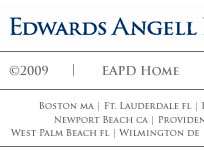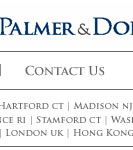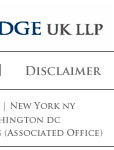
Changes to Disciplinary, Dismissal and Grievance Procedures
On 6 April 2009 the Employment Act 2008 (the 2008 Act) introduced a new regime affecting the vast majority of employment tribunal claims.
At the same time, it repealed the statutory dismissal, disciplinary and grievance procedures introduced only a few years ago in 2002, which had resulted in much case law and difficulties for both employers and employees.
The 2008 Act requires employers and employees to comply with the
new ACAS Code of Practice on Disciplinary and Grievance Procedures (the
Code). The actions of both employers and employees are now judged in line
with the Code by employment tribunals, though the Code is not legally
binding and a failure to follow its provisions does not automatically
result in a penalty. However, if a tribunal considers that there has been
an unreasonable failure on the part of the employer or employee to comply
with the Code, the amount of compensation awarded can be increased or
reduced by up to 25%.
What Will Employers Be Obliged to Do to Ensure They Do Not Fall Foul of the New Provisions?
An important point to note before looking in detail at what an employer must do in relation to disciplinary and grievance issues is that the Code states that employees, and, where appropriate, their representatives, should be involved in the development of disciplinary and grievance rules and procedures. It is not clear from the Code what employers must do to satisfy this requirement and what level of involvement would suffice. It is also unclear whether this places an obligation on employers with existing disciplinary and grievance procedures to go back to employees and/or their representatives to consult with them. It has been left to the employment tribunals to work out the detail of this provision. In the meantime, employees should err on the side of caution – there may be up to a 25% uplift in any award for failure to adequately consult with employees.
Grievence Procedure
Points to note concerning grievance procedures:
Disciplinary Procedure
Points to note concerning disciplinary procedures:
- The Code sets out the well-established case law principles in relation
to carrying out disciplinary investigations, and emphasises the importance
of carrying out an investigation without delay. The employer should
consider that sometimes it is necessary to hold an investigation meeting
with the parties affected. In cases of serious misconduct it may be
necessary for a separate person from the person carrying out the disciplinary
process to carry out a formal investigation.
- It should be remembered that if no investigation is carried out the
employee could get up to a 25% uplift on any compensation awarded by
a tribunal.
- If, following any investigation, it is decided that there is a disciplinary
case for the employee to answer, the employee should be informed of
this in writing in sufficient detail to allow the employee to properly
prepare their answer. Additional allegations cannot be raised at the
disciplinary hearing if no evidence has been provided to the employee
in advance. If new evidence does come to light at a later stage, then
the hearing should be adjourned to allow the employee to review the
new evidence.
- The meeting should be held without unreasonable delay, whilst allowing
the employee enough time to prepare an answer. The employer should take
the employee through the evidence at the beginning of the meeting, before
the employee has to answer the allegations.
- The employee should then be given the opportunity to answer the allegations
and to ask any questions. The employee may also present evidence at
this meeting.
- Both sides have the right to call witnesses at the disciplinary meeting,
and both sides have the right to raise any additional points that arise
out of any information provided by the witnesses.
- The employee has the right to be accompanied at the meeting, as before.
- The employee has the right to appeal against any disciplinary action. No stages of the disciplinary procedure prior to dismissal are excluded, so it seems that the employee has the right to appeal at every stage of the process.
Points to Note
- The Code does not apply to redundancy dismissals, but employers should
not be misled by this and a fair procedure should still be followed
to avoid a claim for unfair dismissal.
- If an employee is subject to disciplinary proceedings and they lodge
a grievance against the manager carrying out the proceedings, the Code
says that the disciplinary proceedings can be adjourned to allow the
employer to deal with the grievance, or alternatively the two proceedings
can be run in tandem. It seems likely that under the Code, grievances
would still have to be dealt with even if they addressed the same substantive
issues as the disciplinary proceedings.
- It is important to remember that the old procedures must still be followed in disciplinary and grievance cases started before 6 April 2009.
The 2008 Act has repealed the statutory dismissal, disciplinary and grievance procedures introduced only a few years ago in 2002, but which had resulted in much case law and difficulties for both employers and employees.
In light of these changes employers would be advised to do the following:
- Review the rest of their disciplinary and grievance procedures to ensure that they do not fall foul of the new Code.
- Provide a clear statement of what acts are likely to constitute gross misconduct. This is not already contained in an employer's disciplinary procedure then it would be good practice for the employer to amend their procedure to include relevant examples.
- Receive advice on what they should do/try to do to meet their consultation obligations.
- Offer training on their disciplinary and grievance procedures to their employees and managers. A failure to do this could result in a 25% uplift in any compensation award.
Contacts
The information in this newsletter is for general
guidance only and is not intended to be a substitute for specific legal
advice. If you would like any further information please contact:

Neil
Adams
Partner, Commercial Litigation - London
t: +44 (0) 20 7556 4572
e: NAdams@eapdlaw.com

Rachel
Lafferty
Associate, London
t: +44 (0) 20 7583 4055
e: RLafferty@eapdlaw.com









